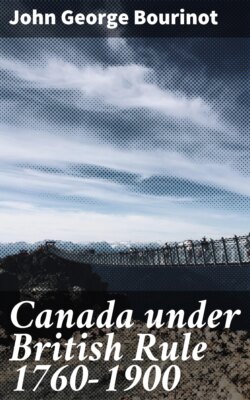Читать книгу Canada under British Rule 1760-1900 - John George Bourinot - Страница 6
На сайте Литреса книга снята с продажи.
THE FRENCH RÉGIME. 1534—1760. SECTION I.—Introduction.
ОглавлениеThough the principal object of this book is to review the political, economic and social progress of the provinces of Canada under British rule, yet it would be necessarily imperfect, and even unintelligible in certain important respects, were I to ignore the deeply interesting history of the sixteen hundred thousand French Canadians, about thirty per cent of the total population of the Dominion. To apply to Canada an aphorism of Carlyle, "The present is the living sum-total of the whole past"; the sum-total not simply of the hundred and thirty years that have elapsed since the commencement of British dominion, but primarily of the century and a half that began with the coming of Champlain to the heights of Quebec and ended with the death of Wolfe on the Plains of Abraham. The soldiers and sailors, the missionaries and pioneers of France, speak to us in eloquent tones, whether we linger in summer time on the shores of the noble gulf which washes the eastern portals of Canada; whether we ascend the St. Lawrence River and follow the route taken by the explorers, who discovered the great lakes, and gave to the world a knowledge of the West and the Mississippi, whether we walk on the grassy mounds that recall the ruins of the formidable fortress of Louisbourg, which once defended the eastern entrance to the St. Lawrence; whether we linger on the rocks of the ancient city of Quebec with its many memorials of the French régime; whether we travel over the rich prairies with their sluggish, tortuous rivers, and memories of the French Canadians who first found their way to that illimitable region. In fact, Canada has a rich heritage of associations that connect us with some of the most momentous epochs of the world's history. The victories of Louisbourg and Quebec belong to the same series of brilliant events that recall the famous names of Chatham, Clive, and Wolfe, and that gave to England a mighty empire in Asia and America. Wolfe's signal victory on the heights of the ancient capital was the prelude to the great drama of the American revolution. Freed from the fear of France, the people of the Thirteen Colonies, so long hemmed in between the Atlantic Ocean and the Appalachian range, found full expression for their love of local self-government when England asserted her imperial supremacy. After a struggle of a few years they succeeded in laying the foundation of the remarkable federal republic, which now embraces forty-five states with a population of already seventy-five millions of souls, which owes its national stability and prosperity to the energy and enterprise of the Anglo-Norman race and the dominant influence of the common law, and the parliamentary institutions of England. At the same time, the American Revolution had an immediate and powerful effect upon the future of the communities that still remained in the possession of England after the acknowledgement of the independence of her old colonies. It drove to Canada a large body of men and women, who remained faithful to the crown and empire and became founders of provinces which are now comprised in a Dominion extending for over three thousand miles to the north and east of the federal republic.
The short review of the French régime, with which I am about to commence this history of Canada, will not give any evidence of political, economic, or intellectual development under the influence of French dominion, but it is interesting to the student of comparative politics on account of the comparisons which it enables us to make between the absolutism of old France which crushed every semblance of independent thought and action, and the political freedom which has been a consequence of the supremacy of England in the province once occupied by her ancient rival. It is quite true, as Professor Freeman has said, that in Canada, which is pre-eminently English in the development of its political institutions, French Canada is still "a distinct and visible element, which is not English—an element older than anything English in the land—and which shows no sign of being likely to be assimilated by anything English." As this book will show, though a hundred and forty years have nearly passed since the signing of the treaty of Paris, many of the institutions which the French Canadians inherited from France have become permanently established in the country, and we see constantly in the various political systems given to Canada from time to time—notably in the constitution of the federal union—the impress of these institutions and the influence of the people of the French section. Still, while the French Canadians by their adherence to their language, civil law and religion are decidedly "a distinct and visible element which is not English"—an element kept apart from the English by positive legal and constitutional guarantees or barriers of separation—we shall see that it is the influence and operation of English institutions, which have made their province one of the most contented communities of the world. While their old institutions are inseparably associated with the social and spiritual conditions of their daily lives, it is after all their political constitution, which derives its strength from English, principles, that has made the French Canadians a free, self-governing people and developed the best elements of their character to a degree which was never possible under the depressing and enfeebling conditions of the French régime.
